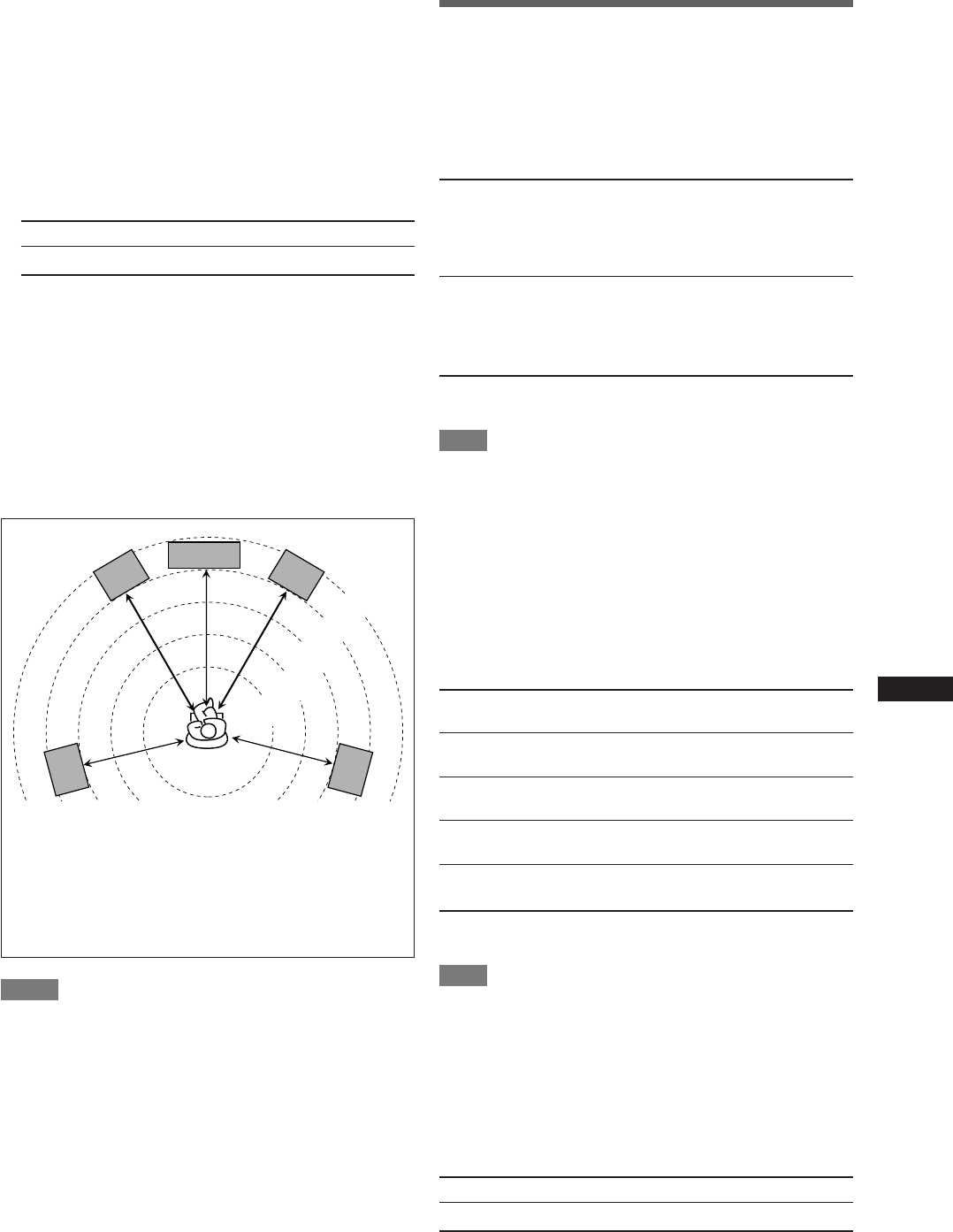
17
Basic settings
Setting the speaker distance
The distance from your listening point to the speakers is one of
the important elements to obtain the best possible sound effect
from the Surround/DSP modes.
By referring to the speaker distance, the receiver automatically
sets the delay time of the sound through each speaker so that
sounds through all the speakers can reach you at the same time.
• If you have used Smart Surround Setup on page 14, this setting
is not required.
7 Measuring unit—DIST UNIT
Select which measuring unit you use.
UNIT :meter Select to set the distance in meters.
UNIT : feet Select to set the distance in feet.
Initial setting: UNIT :meter
7 Speaker distance—
FRNT L DIST (for the left front speaker),
FRNT R DIST (for the right front speaker),
CENTER DIST (for the center speaker),
SURR L DIST (for the left surround speaker),
SURR R DIST (for the right surround speaker)
Adjustable range: 0.3 m to 9.0 m in 0.3 m intervals
(1 ft to 30 ft in 1 ft intervals)
Initial setting: 3.0 m (10 ft) for all speakers
In this case, set the distance as follows:
Left front speaker (L): “FL D : 3.0m (10ft)”
Right front speaker (R): “FR D : 3.0m (10ft)”
Center speaker (C): “C D : 3.0m (10ft)”
Left surround speaker (LS): “LS D : 2.7m (9ft)”
Right surround speaker (RS): “RS D : 2.7m (9ft)”
NOTES
• You cannot set the speaker distance for the speakers you have
set to “NO.”
• If you change speaker distance, the distance and output level
set manually will be applied instead of those set by Smart
Surround Setup.
Setting bass sound
Setting subwoofer output—SUBWFR OUT
You can select the type of the signal which can be transmitted
through the subwoofer. In other words, you can determine
whether or not the bass elements of the front speaker channels
are transmitted through the subwoofer regardless of the front
speaker size setting (either “SML” or “LRG”).
SW: LFE Select to emit only the LFE signals (while
playing Dolby Digital and DTS software) or
the bass elements of the “SML (small)” front
speakers (while playing any source other than
above).
SW:LFE+MAIN Select to always emit the bass elements of
the front speaker channels (MAIN). While
playing Dolby Digital and DTS software, the
bass elements and the LFE signals are both
emitted.
Initial setting: SW: LFE
NOTE
When “SUBWOOFER” is set to “SUBWFR : NO” (see page 16),
this function is not available.
Setting the crossover frequency—CROSS OVER
Small speakers cannot reproduce the bass sounds efficiently. If
you use a small speaker in any position, this receiver
automatically reallocates the bass sound elements assigned to
the small speaker to the large speakers.
To use this function properly, set this crossover frequency level
according to the size of the small speaker connected.
• If you have selected “LRG (large)” for all speakers (see page
16), this function will not take effect (“CROSS: OFF” appears).
CROSS: 80Hz Select when the cone speaker unit built in the
speaker is about 12 cm.
CROSS:100Hz Select when the cone speaker unit built in the
speaker is about 10 cm.
CROSS:120Hz Select when the cone speaker unit built in the
speaker is about 8 cm.
CROSS:150Hz Select when the cone speaker unit built in the
speaker is about 6 cm.
CROSS:200Hz Select when the cone speaker unit built in the
speaker is less than 5 cm.
Initial setting: CROSS:100Hz
NOTE
Crossover frequency is not valid for the HEADPHONE and 3D
HEADPHONE modes.
Setting the low frequency effect attenuator—LFE
ATT
If the bass sound is distorted while playing back software
encoded with Dolby Digital or DTS, set the LFE level to eliminate
distortion.
• This function takes effect only when the LFE signals come in.
LFE : 0dB Normally select this.
LFE : –10dB Select when the bass sound is distorted.
Initial setting: LFE : 0dB
C
L
R
LS
RS
2.1 m
(7 ft)
2.4 m
(8 ft)
2.7 m
(9 ft)
3.0 m
(10 ft)
3.3 m
(11 ft)
EN14-19RXE11S[US_UX]2.p65 06/12/2004, 21:3817
